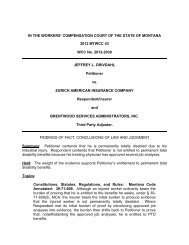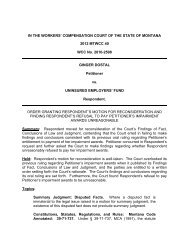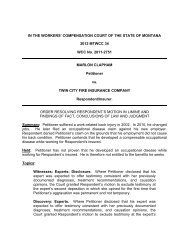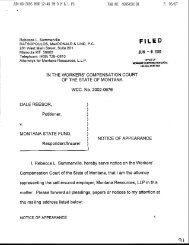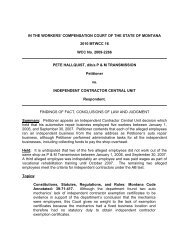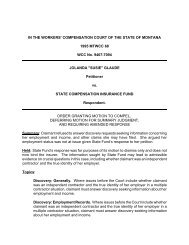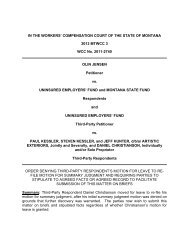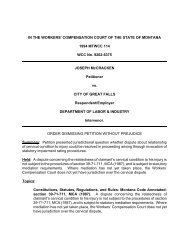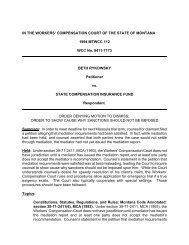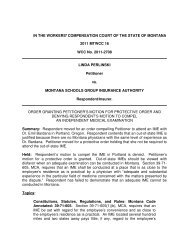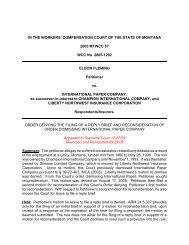Findings of Fact, Conclusions of Law and Judgment - Workers ...
Findings of Fact, Conclusions of Law and Judgment - Workers ...
Findings of Fact, Conclusions of Law and Judgment - Workers ...
Create successful ePaper yourself
Turn your PDF publications into a flip-book with our unique Google optimized e-Paper software.
IN THE WORKERS’ COMPENSATION COURT OF THE STATE OF MONTANA<br />
2012 MTWCC 45<br />
WCC No. 2011-2772<br />
GINGER DOSTAL<br />
Petitioner<br />
vs.<br />
UNINSURED EMPLOYERS’ FUND<br />
Respondent.<br />
FINDINGS OF FACT, CONCLUSIONS OF LAW AND JUDGMENT<br />
Summary: Petitioner <strong>and</strong> Respondent disagree regarding what amount constitutes a<br />
reasonable fee to charge for photocopying certain documents. Respondent has also<br />
refused to authorize certain medical treatment, including referral to a specific<br />
orthopedist who performed previous surgeries on Petitioner’s back; referral to a pain<br />
management specialist; <strong>and</strong> a lumbar spine MRI. Petitioner contends that Respondent<br />
has acted unreasonably in the adjustment <strong>of</strong> her claim, <strong>and</strong> argues that she should<br />
receive her attorney fees <strong>and</strong> a penalty.<br />
Held: Based on the evidence presented, the Court concluded that the parties may<br />
reasonably charge each other 10 cents per page plus $25 per hour <strong>of</strong> labor for<br />
photocopying these documents. Petitioner is entitled to referral to the orthopedist she<br />
requested <strong>and</strong> is also entitled to referral to a pain management specialist. Petitioner is<br />
not entitled to a lumbar MRI. Respondent was unreasonable in refusing the referrals<br />
<strong>and</strong> Petitioner is entitled to her attorney fees <strong>and</strong> a penalty relative to those two issues.<br />
1 The trial in this matter began on October 17, 2011, in Great Falls, Montana, <strong>and</strong><br />
resumed <strong>and</strong> concluded on October 20, 2011, at the <strong>Workers</strong>’ Compensation Court in<br />
Helena. Petitioner Ginger Dostal was present <strong>and</strong> was represented by J. Kim Schulke.<br />
Leanora O. Coles represented Respondent Uninsured Employers’ Fund (UEF).<br />
Bernadette Rice, claims examiner for the UEF, also attended.<br />
2 Exhibits: I admitted Exhibits 1 through 22 without objection. I overruled<br />
Petitioner’s relevancy objections <strong>and</strong> admitted Exhibits 23 through 33. I excluded<br />
Exhibit 34. I admitted pages 1, 6, 7, <strong>and</strong> the top <strong>of</strong> page 2 <strong>of</strong> Exhibit 35. I excluded
pages 3, 4, 5, <strong>and</strong> the bottom <strong>of</strong> page 2 <strong>of</strong> Exhibit 35. Pursuant to Petitioner’s request, I<br />
took judicial notice <strong>of</strong> Exhibits 20 <strong>and</strong> 24 from a previous case involving these parties:<br />
WCC No. 2010-2598. Respondent <strong>of</strong>fered a cleaner copy <strong>of</strong> Exhibit 4, page 20, which I<br />
admitted as Exhibit 4, page 20(a).<br />
3 Witnesses <strong>and</strong> Depositions: The parties agreed that the depositions <strong>of</strong><br />
Rosemary Youderian, FNP, Steve Davison, <strong>and</strong> Toni Broadbent can be considered part<br />
<strong>of</strong> the record. During trial, I took judicial notice <strong>of</strong> the March 16, 2011, deposition <strong>of</strong><br />
Alan K. Dacre, taken in WCC No. 2010-2598. On October 17, 2011, Petitioner Ginger<br />
Dostal, Bernadette Rice, <strong>and</strong> Karla K. Kyweriga were sworn <strong>and</strong> testified at trial. On<br />
October 20, 2011, Rice was recalled <strong>and</strong> testified.<br />
4 Issues Presented: The Pretrial Order sets forth the following issues: 1<br />
Issue One: Whether Respondent should have to reimburse Petitioner’s<br />
counsel’s firm for copying charges totaling $214.40.<br />
Issue Two: Whether Petitioner’s counsel must reimburse Respondent<br />
$1,012 for copy charges.<br />
Issue Three: Whether Respondent should authorize an MRI <strong>of</strong><br />
Petitioner’s lumbar spine.<br />
Issue Four: Whether Respondent should authorize a referral to Dr. Dacre.<br />
Issue Five: Whether Respondent should authorize a referral to a pain<br />
management specialist.<br />
Issue Six: Whether Respondent has acted unreasonably in its h<strong>and</strong>ling <strong>of</strong><br />
Petitioner’s claim such that Petitioner is entitled to attorney fees <strong>and</strong><br />
penalties.<br />
FINDINGS OF FACT<br />
5 Dostal testified at trial. I found her to be a credible witness. Dostal resides in<br />
Stanford, Montana. 2<br />
1 Pretrial Order, Docket Item No. 30, at 9-10.<br />
2 Trial Test.<br />
<strong>Findings</strong> <strong>of</strong> <strong>Fact</strong>, <strong>Conclusions</strong> <strong>of</strong> <strong>Law</strong> <strong>and</strong> <strong>Judgment</strong> – Page 2
6 On May 24, 1993, Dostal suffered an industrial injury to her ankles <strong>and</strong> her back<br />
when she fell <strong>of</strong>f a ro<strong>of</strong> while performing her job duties as a ro<strong>of</strong>er for R<strong>and</strong>y Crowley<br />
Construction in Harlowton, Montana. 3<br />
7 Dostal’s employer was uninsured at the time <strong>of</strong> her industrial injury <strong>and</strong> therefore<br />
the UEF administers her claim. The UEF accepted liability <strong>and</strong> has paid medical<br />
benefits relating to Dostal’s right foot <strong>and</strong> ankle, left ankle, <strong>and</strong> lumbosacral spine. 4<br />
The parties’ disputes regarding Dostal’s medical treatment<br />
8 In August 2004, Dostal began treating with Alan K. Dacre, M.D. 5 Dr. Dacre has<br />
performed three surgeries on Dostal’s back. He performed each surgery in Billings. 6<br />
The first, an anterior lumbar interbody fusion, occurred on December 7, 2004. 7<br />
However, Dr. Dacre regularly saw Dostal in Lewistown when he traveled there to see<br />
patients. 8<br />
9 On April 12, 2006, Dr. Dacre sent a letter to the patients he treated in Lewistown<br />
<strong>and</strong> stated that he would no longer conduct bimonthly clinics in Lewistown. Dr. Dacre<br />
explained that Gregory S. McDowell, M.D., would conduct monthly clinics in Lewistown<br />
<strong>and</strong> would be available to provide spine care. Dr. Dacre further stated that he would<br />
continue to treat patients who were able to travel to Billings for treatment. 9<br />
10 On July 18, 2006, Dr. Dacre performed a second surgery on Dostal’s spine – a<br />
posterior spinal instrumented fusion with posterolateral decompression at L5-S1 –<br />
because <strong>of</strong> a non-union. 10<br />
11 On April 9, 2009, Dr. Dacre operated on Dostal for a third time to remove some<br />
<strong>of</strong> the hardware associated with her 2006 fusion surgery <strong>and</strong> to explore her lumbar<br />
fusion. 11<br />
3 Pretrial Order, Uncontested <strong>Fact</strong>s, at 1.<br />
4 Pretrial Order, Uncontested <strong>Fact</strong>s, at 1-2.<br />
5 Pretrial Order, Uncontested <strong>Fact</strong>s, at 2; Trial Test.<br />
6 Id.<br />
7 Pretrial Order, Uncontested <strong>Fact</strong>s, at 2; Ex. 3 at 33-35.<br />
8 Trial Test.<br />
9 Ex. 3 at 74.<br />
10 Pretrial Order, Uncontested <strong>Fact</strong>s, at 2; Ex. 3 at 80-82.<br />
11 Pretrial Order, Uncontested <strong>Fact</strong>s, at 2; Ex. 3 at 154-55.<br />
<strong>Findings</strong> <strong>of</strong> <strong>Fact</strong>, <strong>Conclusions</strong> <strong>of</strong> <strong>Law</strong> <strong>and</strong> <strong>Judgment</strong> – Page 3
12 In his deposition, Dr. Dacre testified that at some point, he <strong>and</strong> Dostal discussed<br />
the possibility <strong>of</strong> her treating with either Dr. McDowell or Steven Rizzolo, M.D., who<br />
were available for appointments closer to Stanford, but Dostal preferred to continue<br />
treating with Dr. Dacre. 12 Dr. Dacre added that it is not always easy to transfer a patient,<br />
<strong>and</strong> it is “generally frowned upon” to transfer a patient who is in the midst <strong>of</strong> treatment.<br />
He explained:<br />
So patients don’t – number one, they’ve established a provider that they<br />
either get along with or feel is treating them appropriately, <strong>and</strong> it becomes<br />
very difficult for them to, number one, wish to switch.<br />
And number two, another physician may have a bit <strong>of</strong> a different plan. It<br />
may not always necessarily agree with what you’ve done. And it makes<br />
them hard to take – take the liability for that.<br />
. . . .<br />
[F]rom my perspective as a treating physician, I have initiated treatment;<br />
it’s my duty to carry that through. . . . 13<br />
13 Dr. Dacre testified that it is appropriate practice for him to follow patients whom<br />
he has operated on <strong>and</strong> he would generally not transfer a patient to another physician,<br />
even one within his practice, barring extraordinary circumstances. He explained that<br />
the operating physician would have the best knowledge <strong>of</strong> the patient’s condition. 14<br />
Dr. Dacre further testified that patients in the midst <strong>of</strong> treatment are not generally<br />
transferred among surgeons. 15<br />
14 On February 1, 2010, Dr. Dacre found that Dostal had a solid fusion, but that she<br />
needed to continue using prescription medications. Dr. Dacre opined that Dostal could<br />
return to some form <strong>of</strong> work with a lifting restriction. Dr. Dacre recommended that<br />
Dostal follow up with her primary care physician for her prescriptions, but noted he<br />
would continue to see her on an as-needed basis. 16 At the time <strong>of</strong> trial, Dostal had not<br />
treated with Dr. Dacre since the February 1, 2010, appointment. 17<br />
12 Dacre Dep. 75:19 – 76:3.<br />
13 Dacre Dep. 76:19 – 77:15.<br />
14 Dacre Dep. 30:14 – 31:9.<br />
15 Dacre Dep. 70:2-13.<br />
16 Ex. 3 at 206.<br />
17 Trial Test.<br />
<strong>Findings</strong> <strong>of</strong> <strong>Fact</strong>, <strong>Conclusions</strong> <strong>of</strong> <strong>Law</strong> <strong>and</strong> <strong>Judgment</strong> – Page 4
15 On April 29, 2010, Dostal began to treat for her low back with Rosemary<br />
Youderian, FNP, a nurse practitioner who practices in Stanford. 18 Dostal testified that<br />
since she last saw Dr. Dacre in February 2010, her pain has increased <strong>and</strong> has spread<br />
from her low back down into her legs <strong>and</strong> higher into her back. 19 She has also<br />
experienced an increased burning sensation in her feet. 20 Dostal reported these<br />
symptoms to Youderian. 21<br />
16 In her deposition, Youderian testified that she asked William Holmes, M.D., to<br />
review Dostal’s chart to help Youderian make some decisions regarding Dostal’s care.<br />
On March 30, 2010, Dr. Holmes recommended that Youderian refer Dostal to a pain<br />
management specialist. 22 However, the UEF did not authorize the referral. 23<br />
17 On June 22, 2010, Youderian noted that Dostal reported increasing back pain.<br />
Dostal requested an MRI <strong>and</strong> Youderian noted that she would seek authorization for it.<br />
However, she later amended her medical note, stating:<br />
After reviewing the lumbar myelogram report from Billings dated 1-22-<br />
2009, it would be in her best interest to have Dr. Dacre re-evaluate before<br />
any imaging studies are ordered. We will try to get authorization for her to<br />
see Dr. Dacre again. 24<br />
18 Youderian believed Dostal’s MRI request was appropriate because <strong>of</strong> her change<br />
in back pain. 25 However, Youderian testified that she did not believe she should order<br />
this test without having Dostal evaluated by someone with more expertise, so she<br />
recommended that Dostal return to Dr. Dacre. 26 Youderian further noted that in<br />
reviewing Dostal’s medical records, she realized Dostal would need a myelogram rather<br />
than an MRI because Dostal has hardware in her back. 27<br />
19 On August 19, 2010, Youderian examined Dostal <strong>and</strong> found muscle spasm just<br />
above her surgical incision, limited lateral movement <strong>and</strong> twisting, <strong>and</strong> diminished<br />
18 Youderian Dep. 6:9-14; Trial Test.<br />
19<br />
Trial Test.<br />
20<br />
Trial Test.<br />
21<br />
Trial Test.<br />
22<br />
Youderian Dep. 8:6-21.<br />
23<br />
Youderian Dep. 9:12-14.<br />
24<br />
Ex. 4 at 9.<br />
25<br />
Youderian Dep. 14:10-20.<br />
26<br />
Youderian Dep. 15:4-9.<br />
27<br />
Youderian Dep. 15:1-6.<br />
<strong>Findings</strong> <strong>of</strong> <strong>Fact</strong>, <strong>Conclusions</strong> <strong>of</strong> <strong>Law</strong> <strong>and</strong> <strong>Judgment</strong> – Page 5
eflexes. Youderian noted, “I feel the best option would be to get her back to the<br />
orthopedic surgeon (Dr. Dacre) for a re-evaluation.” 28<br />
20 Youderian also noted during the August 19, 2010, visit that Dostal was reporting<br />
worsening back pain. 29 Youderian observed evidence <strong>of</strong> muscle spasm <strong>and</strong> diminished<br />
DTRs, or deep tendon reflexes. 30 Youderian again suggested that Dostal return to<br />
Dr. Dacre for reevaluation. 31 Youderian sent a request for authorization to the UEF, but<br />
Rice denied the authorization. 32<br />
21 On August 23, 2010, Youderian sent a request for authorization to the UEF<br />
asking for authorization for a referral to Dr. Dacre to evaluate Dostal’s back <strong>and</strong> neck<br />
pain. Rice denied the authorization the same day. 33<br />
22 On September 21, 2010, Youderian wrote a letter to Rice, which said:<br />
I am writing to request authorization for Ms. Ginger Dostal to be seen by<br />
Dr. Dacre or another orthopedic specialist for reevaluation <strong>of</strong> her back.<br />
Ms. Dostal has increased pain <strong>and</strong> disability, potentially related to<br />
instability <strong>and</strong> strain at the level above her fusion. Increased pain is<br />
resulting in decreased physical activity, decreased conditioning <strong>and</strong> comorbid<br />
health conditions.<br />
Due to previous surgeries I recommend that she been [sic] seen by<br />
Dr. Dacre who will be able to most efficiently <strong>and</strong> economically evaluate<br />
her complaints <strong>and</strong> recommend treatment.<br />
Please grant this request so Ms. Dostal can receive appropriate care for<br />
her back injury. 34<br />
23 Youderian testified that she remains <strong>of</strong> the opinion she expressed to Rice in her<br />
September 21, 2010, letter: that Dr. Dacre is the best referral for Dostal due to his<br />
28 Ex. 4 at 15.<br />
29 Youderian Dep. 16:13 – 17:7.<br />
30 Youderian Dep. 17:8-17.<br />
31 Youderian Dep. 17:21-24.<br />
32 Youderian Dep. 18:3-13.<br />
33 Ex. 4 at 16.<br />
34 Ex. 4 at 18.<br />
<strong>Findings</strong> <strong>of</strong> <strong>Fact</strong>, <strong>Conclusions</strong> <strong>of</strong> <strong>Law</strong> <strong>and</strong> <strong>Judgment</strong> – Page 6
previous experience in Dostal’s case. 35 Youderian testified that the only reason Rice<br />
ever gave for refusing to authorize treatment with Dr. Dacre was that the UEF would not<br />
cover Dostal’s mileage. 36<br />
24 On October 12, 2010, Youderian noted that she was again recommending to the<br />
UEF that Dostal begin physical therapy <strong>and</strong> receive a referral to an orthopedic or<br />
neurology specialist for an evaluation <strong>of</strong> her back pain. 37 On October 12, 2010, Rice<br />
approved a referral for one month <strong>of</strong> physical therapy. 38 On October 21, 2010,<br />
Youderian noted that she spoke with Rice <strong>and</strong> that Rice “will let us know when <strong>and</strong><br />
where appointment is made for Ginger with orthopedic or neuro specialist. Their <strong>of</strong>fice<br />
is setting up that appointment.” 39<br />
25 On February 18, 2011, Youderian wrote to Rice <strong>and</strong> explained that Dostal had<br />
been reporting increased back pain <strong>and</strong> that the best way to objectively assess her<br />
symptoms was “through certain imaging studies which have been denied.” Youderian<br />
further stated that she was unable to assess the effectiveness <strong>of</strong> Dostal’s medications<br />
because Dostal was only authorized for appointments every six months. Finally<br />
Youderian opined that a pain specialist might be the best solution to manage Dostal’s<br />
condition <strong>and</strong> she asked Rice to respond “if that would be an acceptable solution to your<br />
concerns.” 40<br />
26 Youderian testified that she wrote to Rice on February 18, 2011, <strong>and</strong> requested<br />
that Dostal receive authorization for a referral to a pain specialist because, “I was<br />
running into a brick wall in trying to get her to the orthopedic people. So a pain<br />
specialist was her next option.” 41 Youderian testified that she was seeking a referral for<br />
Dostal because Dostal “continued to have pain that I didn’t feel I was managing well for<br />
her.” 42<br />
27 On May 2, 2011, a h<strong>and</strong>written note in Youderian’s medical records for Dostal<br />
states that Rice called to discuss a recent approval for laboratory testing, which Rice<br />
approved in writing. Rice informed Youderian’s <strong>of</strong>fice that she would approve a referral<br />
35<br />
Youderian Dep. 19:8-18.<br />
36<br />
Youderian Dep. 29:16-24.<br />
37<br />
Ex. 4 at 20.<br />
38<br />
Ex. 4 at 19.<br />
39<br />
Ex. 4 at 20.<br />
40<br />
Ex. 4 at 26.<br />
41<br />
Youderian Dep. 23:6-21.<br />
42<br />
Youderian Dep. 23:22-24.<br />
<strong>Findings</strong> <strong>of</strong> <strong>Fact</strong>, <strong>Conclusions</strong> <strong>of</strong> <strong>Law</strong> <strong>and</strong> <strong>Judgment</strong> – Page 7
to Dr. McDowell. The note further states, “Will not approve Dr. Dacre because will not<br />
cover mileage.” 43<br />
28 Youderian testified that she repeatedly stated that Dostal needed more<br />
evaluation <strong>and</strong> treatment than Youderian could <strong>of</strong>fer. Youderian testified that she felt<br />
like she made no progress in Dostal’s care for a year, so she had been requesting<br />
follow-up care. 44 Youderian testified that her further treatment recommendation for<br />
Dostal is that Dostal be seen by a specialist. 45<br />
29 On August 24, 2011, Dostal’s counsel wrote to the UEF <strong>and</strong> stated that Dostal<br />
was willing to see Dr. McDowell, noting, “The reason for this is that the UEF has denied<br />
her medical treatment with any other provider, including her treating medical provider,<br />
nurse Youdarian [sic] <strong>and</strong> her treating surgeon, Dr. Dacre.” 46<br />
30 On September 6, 2011, Dostal’s counsel repeated her request as the UEF had<br />
not responded to her August 24, 2011, letter. 47<br />
31 On September 20, 2011, the UEF indicated in a discovery response that the UEF<br />
had called Dr. McDowell’s <strong>of</strong>fice on September 1, 2011, to schedule an appointment,<br />
had followed up with additional phone calls on September 6 <strong>and</strong> 8, 2011, <strong>and</strong> was still<br />
awaiting a response from Dr. McDowell’s <strong>of</strong>fice. 48<br />
32 On September 27, 2011, the UEF informed Dostal’s counsel that the UEF had<br />
set an appointment with Dr. McDowell for November 8, 2011. 49 Dostal testified that the<br />
UEF has denied her further treatment with Youderian. 50 Dostal testified that she agreed<br />
to attend an appointment with Dr. McDowell because that was the only treatment the<br />
UEF would authorize. 51<br />
33 Bernadette Rice testified at trial. I found her to be a credible witness. Rice has<br />
worked as a workers’ compensation claims examiner for the UEF since 1993. Rice’s<br />
job duties include adjudicating workers’ compensation claims, authorizing indemnity<br />
43<br />
Ex. 4 at 30.<br />
44<br />
Youderian Dep. 79:6-15.<br />
45<br />
Youderian Dep. 80:4-5.<br />
46<br />
Ex. 16.<br />
47<br />
Ex. 17.<br />
48<br />
Ex. 18.<br />
49<br />
Ex. 19.<br />
50<br />
Trial Test.<br />
51<br />
Trial Test.<br />
<strong>Findings</strong> <strong>of</strong> <strong>Fact</strong>, <strong>Conclusions</strong> <strong>of</strong> <strong>Law</strong> <strong>and</strong> <strong>Judgment</strong> – Page 8
payments, <strong>and</strong> testifying in court. Rice determines whether the UEF accepts or denies<br />
a claim. 52<br />
34 Rice acknowledged that Dostal had a “long st<strong>and</strong>ing” relationship with Dr. Dacre,<br />
<strong>and</strong> that she treated with him for six years, including three surgeries. 53<br />
35 Rice testified that she authorized Dostal to treat with Youderian, but she did not<br />
authorize a referral to Dr. Malters or to a pain management specialist. 54 Rice testified<br />
that, although Youderian mentioned in her treatment notes that she wanted to refer<br />
Dostal to Dr. Dacre, Youderian never sent a request for authorization to the UEF, <strong>and</strong><br />
therefore Rice did not grant or deny a referral. 55 However, Rice also testified that when<br />
she received Youderian’s request for authorization for a referral to Dr. Dacre on<br />
August 23, 2010, she denied the request. Rice did not provide Youderian with a reason<br />
for her denial. 56<br />
36 Rice testified that on October 12, 2010, she received a request from Youderian to<br />
authorize referral to a physical therapist. Rice approved one month <strong>of</strong> physical therapy.<br />
However, Youderian’s subsequent treatment notes indicate that Dostal’s condition did<br />
not improve after physical therapy. 57<br />
37 Rice testified that her practice is to require a request for authorization in writing<br />
from a medical provider <strong>and</strong> she will then either approve or deny the authorization <strong>and</strong><br />
fax the request back to the provider. Rice testified that if she reviewed a medical note<br />
where a provider referenced the need for a procedure, Rice would wait for a written<br />
request for authorization <strong>and</strong> would not treat the medical note as a request for<br />
authorization. Rice testified that she does not know <strong>of</strong> any doctors who do not send in<br />
requests for authorization. 58 Rice further testified that she does not recall ever having a<br />
situation where she has gotten a request for authorization from a medical provider that<br />
was not written on an authorization form, but she believes she would need to have a<br />
written request for authorization before she would consider authorizing a medical<br />
treatment. 59 Rice further testified that there is no statute which requires the UEF to only<br />
consider requests for authorization that are submitted in writing on a form to the UEF,<br />
52<br />
Trial Test.<br />
53<br />
Trial Test.<br />
54<br />
Trial Test.<br />
55<br />
Trial Test.<br />
56<br />
Trial Test.<br />
57<br />
Trial Test.<br />
58<br />
Trial Test.<br />
59<br />
Trial Test.<br />
<strong>Findings</strong> <strong>of</strong> <strong>Fact</strong>, <strong>Conclusions</strong> <strong>of</strong> <strong>Law</strong> <strong>and</strong> <strong>Judgment</strong> – Page 9
<strong>and</strong> she is not aware <strong>of</strong> any administrative rule or written policy at the department or at<br />
the UEF that requires this. She further testified that the UEF does not have a written<br />
authorization form <strong>of</strong> its own. 60 Rice testified that if a medical provider sent a request for<br />
authorization in the form <strong>of</strong> a letter rather than on a form, she might consider that<br />
sufficient if the letter is specific enough in its request. However, the letter would need to<br />
come from the treatment provider; Rice testified that a letter from a claimant’s attorney<br />
pointing out a referral for treatment in a provider’s medical record would be insufficient<br />
for her to consider it as a request for authorization. 61<br />
38 Rice testified that on several occasions, she reviewed Youderian’s medical notes<br />
<strong>and</strong> saw that Youderian believed Dostal should see an orthopedist. However, Rice did<br />
not act upon the recommendation because Youderian did not send in a form requesting<br />
authorization for the referral. Rice testified that, if the UEF discovers a recommendation<br />
in a treatment note, it is not the UEF’s policy to contact providers <strong>and</strong> inform them that<br />
they must send in a separate, written request for authorization in order for the UEF to<br />
consider authorizing the treatment. Rice testified that there is no indication that she or<br />
anyone at the UEF ever informed Youderian’s <strong>of</strong>fice that Youderian would need to<br />
submit a written request for authorization form in order to have the UEF consider<br />
Youderian’s treatment recommendations. 62<br />
39 Rice admitted that she based her May 3, 2011, letter to Youderian in which she<br />
agreed to authorize Dostal’s referral to Dr. McDowell on Youderian’s October 12, 2010,<br />
request for a referral to an orthopedist – which she found in Youderian’s treatment note<br />
<strong>of</strong> that date <strong>and</strong> for which Youderian did not send a separate, written request for<br />
authorization. 63 Rice <strong>of</strong>fered no explanation for why she chose to deviate from her usual<br />
practice in this particular instance, but not in other instances, while adjusting Dostal’s<br />
claim.<br />
40 Rice testified that on August 10, 2011, she denied a request for Dostal to see<br />
Youderian after Dostal reported increased back pain. Rice stated that she did so<br />
because in May 2011, Youderian stated that she did not have other treatment to <strong>of</strong>fer<br />
Dostal at that time. While Rice acknowledged that it is possible that Dostal’s condition<br />
may have changed between May <strong>and</strong> August 2011, she still refused to allow Dostal to<br />
return to Youderian. 64<br />
60<br />
Trial Test.<br />
61<br />
Trial Test.<br />
62<br />
Trial Test.<br />
63<br />
Trial Test.<br />
64<br />
Trial Test.<br />
<strong>Findings</strong> <strong>of</strong> <strong>Fact</strong>, <strong>Conclusions</strong> <strong>of</strong> <strong>Law</strong> <strong>and</strong> <strong>Judgment</strong> – Page 10
41 Although Rice testified that she did not intend to refuse to authorize any medical<br />
treatment for Dostal until Dostal agreed to see Dr. McDowell, Rice did in fact refuse to<br />
authorize all other medical treatment Dostal requested from the time Dostal refused to<br />
see Dr. McDowell until Dostal agreed to see him. Rice then scheduled an appointment<br />
with Dr. McDowell for November 8, 2011. Rice testified that she did not characterize<br />
Dr. McDowell’s pending examination as an independent medical examination (IME), but<br />
rather as the orthopedic referral Youderian had requested. 65<br />
42 Rice testified that the UEF would not object to Dostal treating with Dr. Dacre if<br />
Dr. Dacre resumed travelling to Lewistown, <strong>and</strong> that the sole objection the UEF has to<br />
Dostal treating with Dr. Dacre is the travel to Billings. 66<br />
43 Rice admitted that it would not entail any significant travel expense to allow<br />
Dostal to treat with Dr. Dacre in Billings. 67 Rice testified that she was concerned about<br />
Dostal traveling to Billings to see Dr. Dacre since she had reported that driving in a car<br />
aggravated her condition. However, she never asked Youderian or Dr. Dacre if it would<br />
be appropriate for Dostal to travel to Billings for medical appointments. 68<br />
The parties’ disputes regarding photocopy charges<br />
44 On March 3, 2010, Megan Miller, a paralegal at Dostal’s counsel’s firm, wrote to<br />
Rice <strong>and</strong> requested a copy <strong>of</strong> Dostal’s claim file. Miller asked Rice to contact the firm<br />
prior to providing the copy if the charge for the copying was expected to exceed $100. 69<br />
Rice informed Miller that the charge would exceed $100. Miller confirmed that the firm<br />
still wanted a complete copy <strong>of</strong> the file. 70<br />
45 Rice testified that since the UEF is not an insurer, she does not believe the UEF<br />
is obligated to make copies <strong>of</strong> its claims files available to claimants. However, the UEF<br />
copies files upon request. 71 On April 15, 2010, Rice provided Dostal’s counsel’s firm<br />
with a copy <strong>of</strong> the claim file, along with a bill for $1,012 for 2024 photocopies – a rate <strong>of</strong><br />
65 Trial Test.<br />
66 Trial Test.<br />
67 Trial Test.<br />
68 Trial Test.<br />
69 Ex. 6.<br />
70 Ex. 7.<br />
71 Trial Test.<br />
<strong>Findings</strong> <strong>of</strong> <strong>Fact</strong>, <strong>Conclusions</strong> <strong>of</strong> <strong>Law</strong> <strong>and</strong> <strong>Judgment</strong> – Page 11
$.50 per page. 72 Rice testified that Dostal’s claim file was “several feet thick” <strong>and</strong> that it<br />
took a UEF employee over 40 hours to copy it. 73<br />
46 On May 27, 2010, Dostal’s counsel wrote to Rice <strong>and</strong> disputed the UEF’s fee <strong>of</strong><br />
$.50 per page for photocopies. Dostal’s counsel, relying on Stewart v. MACo <strong>Workers</strong>’<br />
Compen. Trust, 74 contended that copies <strong>of</strong> claims files should be provided at the<br />
prevailing rate for copies in the community where the claim file is maintained. Dostal’s<br />
counsel stated that her <strong>of</strong>fice had called several copy shops <strong>and</strong> determined that the<br />
prevailing cost for photocopies was $.10 per copy. Dostal’s counsel further noted that<br />
<strong>of</strong> the 2024 pages provided, 252 were duplicates. Dostal’s counsel enclosed a check<br />
for $177.20 for 1,772 copies at $.10 per page. 75<br />
47 Rice acknowledged that Dostal’s counsel returned 252 pages as duplicates <strong>and</strong><br />
tendered a check for $177.20. Rice testified that she did not contact Dostal’s counsel to<br />
inform her that the reduced payment was unacceptable because Dostal’s counsel was<br />
aware that the reduced payment was unacceptable. 76<br />
48 Rice testified that the UEF charges $.50 per page for copies because the<br />
Secretary <strong>of</strong> State’s <strong>of</strong>fice charges $.50 per page. Rice did not investigate what charge<br />
would be sufficient to recover the cost <strong>of</strong> the material <strong>and</strong> time expended to make the<br />
copies. 77 Rice testified that no written policy states that the UEF’s or the department’s<br />
copy charge is $.50 per page. Rice further testified that she did not investigate how<br />
much it would cost to have the claim file copied by a private copy shop. She stated that<br />
no statute or rule either prohibits or permits having a private copy shop copy a claims<br />
file. However, the UEF is required to maintain confidentiality. 78<br />
49 On July 8, 2010, Dostal’s counsel wrote to Rice about new developments in the<br />
dispute between her firm <strong>and</strong> the UEF regarding the UEF’s copy charges for Dostal’s<br />
claim file. She stated:<br />
Recently, you refused payment for services related to another claim for<br />
another worker, which is being h<strong>and</strong>led by my partner, Stacy Tempel-<br />
72<br />
Ex. 8.<br />
73<br />
Trial Test. Considering that a ream <strong>of</strong> photocopy paper consists <strong>of</strong> 500 pages <strong>and</strong> is approximately 2"<br />
thick, if Rice’s estimate is accurate, I can only surmise that Dostal’s file was either carved upon clay tablets or<br />
maintained in very, very thick folders.<br />
74 2008 MTWCC 22.<br />
75 Ex. 9.<br />
76 Trial Test.<br />
77 Trial Test.<br />
78 Trial Test.<br />
<strong>Findings</strong> <strong>of</strong> <strong>Fact</strong>, <strong>Conclusions</strong> <strong>of</strong> <strong>Law</strong> <strong>and</strong> <strong>Judgment</strong> – Page 12
St. John, in lieu <strong>of</strong> the remaining balance you feel is still owed on the bill<br />
for Ms. Dostal’s claim file. We have received no correspondence from you<br />
in response to the payment we submitted indicating payment was not<br />
accepted or sufficient. 79<br />
50 Rice acknowledged that another UEF claimant who is represented by an attorney<br />
in the same firm as Dostal’s counsel was denied reimbursement <strong>of</strong> a test fee because <strong>of</strong><br />
the dispute over the copy fees in Dostal’s case. 80 However, the UEF reimbursed the<br />
test fee in the other claim after Tempel-St. John filed a petition for mediation. 81<br />
51 On April 13, 2011, Dostal’s counsel sent the UEF a bill for $214.40 <strong>and</strong> a letter<br />
requesting payment for copying documents in response to a subpoena duces tecum. 82<br />
The invoice reflected three copies <strong>of</strong> a 200-page document ($60), one copy <strong>of</strong> a 944page<br />
document ($94.40), <strong>and</strong> a $60 fee for “excess time.” 83 Rice admitted that the UEF<br />
received the bill <strong>and</strong> has refused to pay it. 84<br />
52 In the Pretrial Order, the UEF contended that the amount billed for the copies it<br />
requested is incorrect. The UEF contends it agreed to pay $.10 per page, but the firm<br />
billed it for more copies than the UEF received, <strong>and</strong> further added a h<strong>and</strong>ling charge<br />
which the UEF did not agree to. The UEF explained:<br />
The photo copy bill from Petitioner’s counsel’s firm reflects that there were<br />
three copies <strong>of</strong> 200 pages; however this was a copy <strong>of</strong> Exhibit No. 52 in<br />
WCC No. 2010-2598, which was 190 pages, not 200 pages. The bill also<br />
reflects that there was one copy <strong>of</strong> 944 pages at .10 [sic] cents for an<br />
amount <strong>of</strong> $94.40. However, this was a copy <strong>of</strong> Exhibit No. 57 in WCC<br />
No. 2010-2598, which was 878 pages, not 944. The bill also included an<br />
amount <strong>of</strong> $60.00 for a copy time fee, which the UEF did not agree to pay.<br />
Thus, the UEF contends that the actual photo copy amount owing for the<br />
copies provided by Petitioner’s counsel’s firm is: $144.80, not $214.40. 85<br />
53 Karla K. Kyweriga testified at trial. I found her to be a credible witness. Kyweriga<br />
owns a print shop in Great Falls. Kyweriga has been in the photocopying business for<br />
79<br />
Ex. 10.<br />
80<br />
Trial Test.<br />
81<br />
Trial Test.<br />
82<br />
Ex. 13.<br />
83<br />
Ex. 13 at 2.<br />
84<br />
Trial Test.<br />
85<br />
Pretrial Order at 7-8.<br />
<strong>Findings</strong> <strong>of</strong> <strong>Fact</strong>, <strong>Conclusions</strong> <strong>of</strong> <strong>Law</strong> <strong>and</strong> <strong>Judgment</strong> – Page 13
approximately 35 years. She testified that her shop typically charges $.10 per page for<br />
one-sided, black-<strong>and</strong>-white copies on 8.5" by 11" paper. Additional charges apply for<br />
larger sheets <strong>and</strong> color copies. For complicated jobs, her shop adds a surcharge <strong>of</strong> $20<br />
per hour in addition to the per-page copy charge. Kyweriga testified that she recently<br />
copied a complex job which took approximately three hours to copy 944 pages. She<br />
further testified that she would consider the claim file in this case to be a complex job<br />
<strong>and</strong> she would charge the $20 per hour surcharge in addition to the per-page fee to<br />
reproduce it. 86<br />
54 Steve Davison, the owner <strong>and</strong> manager <strong>of</strong> Action Print in Helena, testified via<br />
deposition. 87 Davison testified that he has been involved in the copying business in<br />
Helena for 20 years. 88 His business occasionally makes photocopies for state<br />
agencies. 89 Davison testified that for a job which consists <strong>of</strong> multiple boxes <strong>of</strong><br />
documents <strong>and</strong> requires removing staples <strong>and</strong> restapling documents, he would typically<br />
charge $.10 per copy plus $30 per hour <strong>of</strong> time. 90 Davison testified that for his business<br />
to copy files at its Helena location, the files need to be allowed to leave the state agency<br />
for copying purposes. 91 However, on occasion, his company has taken a photocopier to<br />
an agency <strong>and</strong> made the copies onsite. 92<br />
55 Toni Broadbent, the owner <strong>of</strong> Allegra Marketing Print <strong>and</strong> Web (Allegra), testified<br />
via deposition. 93 Allegra performs commercial <strong>and</strong> digital printing services, including<br />
photocopying. 94 Broadbent testified that Allegra regularly makes photocopies for state<br />
agencies. 95 Broadbent testified that for a complex job that requires “special h<strong>and</strong>ling” –<br />
including unstapling <strong>and</strong> restapling documents, removing <strong>and</strong> replacing documents in<br />
binders, <strong>and</strong> dealing with different sizes <strong>of</strong> original documents – Allegra typically<br />
charges between $.15 <strong>and</strong> $.25 per copy, plus a $100 per hour h<strong>and</strong>ling fee. 96<br />
86<br />
Trial Test.<br />
87<br />
Davison Dep. 4:14-22.<br />
88<br />
Davison Dep. 5:2-4.<br />
89<br />
Davison Dep. 5:5-6.<br />
90<br />
Davison Dep. 6:2-11.<br />
91<br />
Davison Dep. 7:22-24.<br />
92<br />
Davison Dep. 8:7-15.<br />
93<br />
Broadbent Dep. 4:13-18.<br />
94<br />
Broadbent Dep. 4:19-25.<br />
95<br />
Broadbent Dep. 5:4-6.<br />
96<br />
Broadbent Dep. 5:12 – 6:5.<br />
<strong>Findings</strong> <strong>of</strong> <strong>Fact</strong>, <strong>Conclusions</strong> <strong>of</strong> <strong>Law</strong> <strong>and</strong> <strong>Judgment</strong> – Page 14
Post-Trial Developments<br />
56 As noted in the findings above, at the time <strong>of</strong> trial, Rice had scheduled an<br />
appointment for Dostal to be seen by Dr. McDowell. On November 4, 2011, I convened<br />
a conference call with the parties to make an oral ruling concerning Dostal’s ongoing<br />
medical treatment.<br />
57 During the conference call, I granted Dostal’s request to continue treating with<br />
Dr. Dacre. I noted that Dr. Dacre might be able to address two issues: Whether the<br />
UEF should authorize referral to a pain management specialist, <strong>and</strong> whether the UEF<br />
should authorize a lumbar spine MRI. I ordered the parties to provide a status report<br />
regarding these issues to the Court following Dostal’s appointment with Dr. Dacre. I<br />
further ordered the November 8, 2011, appointment with Dr. McDowell cancelled. 97<br />
58 On November 22, 2011, the UEF notified the Court that Dr. Dacre had refused to<br />
see Dostal, stating that he had nothing further to <strong>of</strong>fer Dostal <strong>and</strong> suggesting that Dostal<br />
seek another opinion. 98<br />
59 On January 24, 2012, the UEF informed the Court that Dostal would be seen by<br />
a neuro-specialist on March 1, 2012, to seek the opinion recommended by Dr. Dacre. 99<br />
On January 26, 2012, Dostal’s counsel informed the Court that Dostal would obtain a<br />
CT lumbar/myelogram on January 27, 2012, <strong>and</strong> was scheduled to see Dr. John<br />
VanGilder on March 1, 2012. 100<br />
60 On March 22, 2012, the UEF informed the Court that Dr. VanGilder had<br />
recommended that Dostal receive L4-5 bilateral facet joint injections, <strong>and</strong> that the UEF<br />
had authorized the treatment. The UEF contended that the issue <strong>of</strong> whether it should<br />
authorize a referral to Dr. Dacre was now moot. 101<br />
61 The UEF further contended that the issue <strong>of</strong> whether it should authorize a lumbar<br />
MRI was also moot because both Dr. VanGilder <strong>and</strong> Youderian had indicated that<br />
Dostal could not undergo an MRI because <strong>of</strong> hardware in her back. 102<br />
97 See Minute Book Hearing No. 4342, Docket Item No. 34.<br />
98 Nov. 22, 2011, Letter From Coles to Clara Wilson, Clerk <strong>of</strong> Court, Docket Item No. 35.<br />
99 E-Mail From Coles to Jackie Poole, Deputy Clerk <strong>of</strong> Court, Docket Item No. 36.<br />
100 Status Report, Docket Item No. 37<br />
101 E-Mail From Coles to Wilson, Docket Item No. 42.<br />
102 Id.<br />
<strong>Findings</strong> <strong>of</strong> <strong>Fact</strong>, <strong>Conclusions</strong> <strong>of</strong> <strong>Law</strong> <strong>and</strong> <strong>Judgment</strong> – Page 15
62 The UEF further contended that the issue <strong>of</strong> whether it should authorize a referral<br />
to a pain management specialist was moot because Dr. VanGilder had not<br />
recommended a referral. 103<br />
63 On March 29, 2012, Dostal filed a status report in which she stated that the<br />
issues regarding the referral to Dr. Dacre <strong>and</strong> authorization for a lumbar MRI were<br />
resolved. Dostal maintains that the issue <strong>of</strong> whether she was entitled to referral to a<br />
pain management specialist remains an issue for determination. Dostal noted that while<br />
Dr. VanGilder did not recommend a referral to a pain management specialist, he was<br />
not asked whether he believed such a referral was necessary. 104<br />
64 On August 10, 2012, the UEF filed a status report with the Court in which it<br />
stated:<br />
Based on Dr. VanGilder’s recommendations, the UEF has authorized a<br />
CT Lumbar/Myelogram, L4-5 bilateral facet joint injections, <strong>and</strong> a referral<br />
for psychological counseling. Additionally, since Dr. VanGilder has<br />
indicated that Ms. Dostal is again not at MMI for her industrially related<br />
back condition, the UEF has started payment <strong>of</strong> TTD benefits. 105<br />
CONCLUSIONS OF LAW<br />
65 This case is governed by the 1991 version <strong>of</strong> the <strong>Workers</strong>’ Compensation Act<br />
(WCA) since that was the law in effect at the time <strong>of</strong> Dostal’s industrial accident. 106<br />
66 Dostal bears the burden <strong>of</strong> proving by a preponderance <strong>of</strong> the evidence that she<br />
is entitled to the benefits she seeks. 107 Dostal has met her burden <strong>of</strong> pro<strong>of</strong>.<br />
Issue One: Whether Respondent should have to reimburse<br />
Petitioner’s counsel’s firm for copying charges totaling $214.40.<br />
Issue Two: Whether Petitioner’s counsel must reimburse<br />
Respondent $1,012 for copy charges.<br />
103 Id.<br />
104 Petitioner’s Status Report to Court, Docket Item No. 43.<br />
105 Uninsured Employers’ Fund’s Status Report, Docket Item No. 44.<br />
106 Buckman v. Montana Deaconess Hosp., 224 Mont. 318, 321, 730 P.2d 380, 382 (1986).<br />
107<br />
Ricks v. Teslow Consol., 162 Mont. 469, 512 P.2d 1304 (1973); Dumont v. Wickens Bros. Constr. Co.,<br />
183 Mont. 190, 598 P.2d 1099 (1979).<br />
<strong>Findings</strong> <strong>of</strong> <strong>Fact</strong>, <strong>Conclusions</strong> <strong>of</strong> <strong>Law</strong> <strong>and</strong> <strong>Judgment</strong> – Page 16
67 Both parties allege that the other party charged them an unreasonable amount<br />
for photocopies. Dostal contends that she was incorrectly charged for duplicate copies.<br />
The UEF contends that it was charged for more copies than it received. Neither party<br />
has provided any evidence to dispute the other’s contentions regarding the number <strong>of</strong><br />
copies each should have been respectively charged for: Dostal does not argue that the<br />
UEF’s count <strong>of</strong> 1,068 photocopies is inaccurate <strong>and</strong> the UEF does not dispute Dostal’s<br />
contention that, excluding duplicates, she received 1,772 copies from the UEF – nor<br />
does the UEF dispute Dostal’s contention that she should not be held liable for payment<br />
for duplicative copies.<br />
68 Therefore, I conclude that Dostal is liable to the UEF for the cost <strong>of</strong> 1,772<br />
photocopies while the UEF is liable to Dostal for the cost <strong>of</strong> 1,068 photocopies.<br />
However, I now must determine what constitutes a reasonable charge for the copies.<br />
69 In Stewart v. MACo <strong>Workers</strong>’ Compen. Trust, I was faced with a dispute<br />
regarding the charges an insurer levied against a claimant for a copy <strong>of</strong> his claim file. 108<br />
In Stewart, the insurer argued:<br />
Montana law recognizes the charging for copies in a number <strong>of</strong> statutory<br />
references, including the State Auditor’s <strong>of</strong>fice, which is required to charge<br />
50¢ per page for furnishing photostatic copies <strong>of</strong> securities information<br />
(§ 30-10-107, MCA); clerks <strong>of</strong> district courts are required to charge $1 per<br />
page for the first ten pages <strong>and</strong> 50¢ for each additional page for copies <strong>of</strong><br />
papers on file in the clerks’ <strong>of</strong>fices (§ 25-1-201, MCA); <strong>and</strong> the Secretary<br />
<strong>of</strong> State’s <strong>of</strong>fice, which charges $1 per page for copies <strong>of</strong> information from<br />
the Secretary’s <strong>of</strong>fice, with a minimum <strong>of</strong> $5 due (ARM 1.2.104). 109<br />
70 I rejected the use <strong>of</strong> the insurer’s proposed “guidelines,” concluding instead that<br />
an insurer may charge a “reasonable amount” – the same amount as is commonly<br />
charged by businesses in the community which <strong>of</strong>fer photocopy services to the public<br />
where the claim file is maintained. 110<br />
71 Rice testified that she does not believe Stewart applies to the UEF because the<br />
UEF is not an insurer. 111 As set forth above, Rice testified that she believes that WCA<br />
108<br />
2008 MTWCC 22.<br />
109<br />
Stewart, 5 (footnote deleted).<br />
110<br />
Stewart, 11.<br />
111<br />
I note that the UEF further argued that it has no obligation to provide a claimant with a copy <strong>of</strong> her claim<br />
file under § 39-71-107(3), MCA, because it is not an insurer. Section 39-71-107, MCA, did not exist in the 1991 WCA<br />
<strong>and</strong> therefore the question <strong>of</strong> whether this statute now applies to the UEF is not relevant to Dostal’s case <strong>and</strong> I do not<br />
consider that argument here.<br />
<strong>Findings</strong> <strong>of</strong> <strong>Fact</strong>, <strong>Conclusions</strong> <strong>of</strong> <strong>Law</strong> <strong>and</strong> <strong>Judgment</strong> – Page 17
statutes which refer to “the department” are applicable to the UEF because the UEF is a<br />
part <strong>of</strong> the Department <strong>of</strong> Labor <strong>and</strong> Industry.<br />
72 Section 39-71-205(1), MCA, provides that “the department” shall have power <strong>and</strong><br />
authority to charge <strong>and</strong> collect a fee for copies <strong>of</strong> papers <strong>and</strong> records sufficient to<br />
recover the cost <strong>of</strong> the material <strong>and</strong> the time expended, as fixed by the department. By<br />
Rice’s own testimony, however, the UEF did not set its fee for copies based on the cost<br />
<strong>of</strong> material <strong>and</strong> time expended. Rather, the UEF used as a “guideline” that which I<br />
rejected in Stewart. Rice has provided no evidence as to the cost <strong>of</strong> material nor the<br />
cost <strong>of</strong> the time expended. Since it is clear that the UEF did not set its copying fees<br />
based upon § 39-71-205(1), MCA, I find its argument that the Court should do so to be<br />
unpersuasive.<br />
73 The parties presented the testimony <strong>of</strong> three business owners who provide<br />
photocopying services to the public. Each testified that, in addition to a per-page<br />
copying charge, they would charge an hourly rate for a complex copying job – one<br />
which required stapling <strong>and</strong> unstapling, <strong>and</strong> other “special h<strong>and</strong>ling.” Given the size<br />
<strong>and</strong> age <strong>of</strong> Dostal’s claim file, I find it reasonable to infer that her file would be<br />
considered “complex” or require “special h<strong>and</strong>ling” if it had been taken to any <strong>of</strong> these<br />
three businesses for copying. Likewise, I find it reasonable to infer that the documents<br />
Dostal copied for the UEF in response to a subpoena duces tecum required similar<br />
“special h<strong>and</strong>ling.”<br />
74 Therefore, I conclude that an hourly fee, in addition to a per-page charge for<br />
copies, is reasonable in the present case. While Rice contends that it took a UEF<br />
employee forty hours to copy Dostal’s claim file, I find that time estimate excessive. As<br />
noted above, Kyweriga testified that she recently copied a complex job which took<br />
approximately three hours to copy 944 pages – or, approximately 315 pages per hour. I<br />
therefore conclude that it is more probable than not that the 1,772 non-duplicated pages<br />
<strong>of</strong> Dostal’s claim file could have been copied in six hours. I further conclude that it is<br />
more probable than not that Dostal could have copied 1,068 pages for the UEF in three<br />
<strong>and</strong> one-half hours. 112<br />
75 In considering the amounts each copy shop owner testified he or she would<br />
charge for these kinds <strong>of</strong> copying charges, I note that Kyweriga <strong>and</strong> Davison would<br />
charge similar amounts while Broadbent’s hypothetical charges would be significantly<br />
higher. I therefore have split the difference between Kyweriga’s <strong>and</strong> Davison’s<br />
estimates for the present case: I hold that a reasonable amount for the parties to<br />
charge each other for these photocopies is $.10 per page plus $25 per hour for<br />
112 I have rounded up the estimates in both instances to the nearest half-hour increment.<br />
<strong>Findings</strong> <strong>of</strong> <strong>Fact</strong>, <strong>Conclusions</strong> <strong>of</strong> <strong>Law</strong> <strong>and</strong> <strong>Judgment</strong> – Page 18
h<strong>and</strong>ling. Therefore, the UEF owes Dostal $194.30 for photocopying charges 113 <strong>and</strong><br />
Dostal owes the UEF $327.20 for photocopying charges. 114<br />
Issue Three: Whether Respondent should authorize an MRI <strong>of</strong><br />
Petitioner’s lumbar spine.<br />
Issue Four: Whether Respondent should authorize a referral to<br />
Dr. Dacre.<br />
76 As indicated in the findings above, these issues have been resolved to the<br />
satisfaction <strong>of</strong> both parties <strong>and</strong> therefore I need take no further action.<br />
Issue Five: Whether Respondent should authorize a referral to a<br />
pain management specialist.<br />
77 Dostal argues that she is entitled to referral to a pain management specialist, as<br />
recommended by Youderian, her treating physician. The UEF states that Youderian<br />
became Dostal’s treating physician sometime on or after March 30, 2010. 115 However,<br />
in spite <strong>of</strong> Youderian’s repeated requests for referral to a pain management specialist,<br />
the UEF has refused to authorize the referral. It is not entirely clear to the Court on<br />
which specific grounds the UEF bases this denial. The UEF has contended that under<br />
§ 39-71-605, MCA, it is entitled to refuse to authorize any further treatment for Dostal<br />
until she submits to an evaluation with Dr. McDowell. 116 However, it does not appear<br />
from the record that the UEF requested Dostal to attend an evaluation with Dr.<br />
McDowell until May 3, 2011. 117 Therefore, this cannot be the grounds upon which the<br />
UEF denied the referral to a pain management specialist from March 30, 2010, until<br />
May 3, 2011 – over a year later.<br />
78 The UEF further contends that it need not provide “services <strong>and</strong> treatment” to<br />
Dostal unless the request is supported by objective medical findings. However, the<br />
UEF acknowledges that, unlike its present-day counterpart, § 39-71-704, MCA (1991),<br />
did not require objective medical findings. 118 The UEF argues, however, that<br />
Youderian’s initial request for authorization for referral to a pain specialist was properly<br />
113 (1,068 x $.10) + (3.5 x $25) = $194.30.<br />
114 (1,772 x $.10) + (6 x $25) = $327.20.<br />
115 Pretrial Order at 7.<br />
116 Pretrial Order at 8.<br />
117<br />
See Ex. 4 at 32.<br />
118<br />
Although the UEF maintains that “the term was used in case law at that time,” it does not cite a single<br />
example nor does it allege that, simply because the term “was used” that it was used in any manner applicable to<br />
supporting the UEF’s position in this instance.<br />
<strong>Findings</strong> <strong>of</strong> <strong>Fact</strong>, <strong>Conclusions</strong> <strong>of</strong> <strong>Law</strong> <strong>and</strong> <strong>Judgment</strong> – Page 19
denied because it was not supported by any objective medical findings. 119 The UEF<br />
maintains that Dr. Holmes needed to have provided objective medical findings to<br />
support his recommendation that Dostal see a pain management specialist. 120 The UEF<br />
further argues that Youderian testified that she was unsure what treatment she could<br />
<strong>of</strong>fer Dostal other than referral to a specialist, but that Youderian’s basis for<br />
recommending a referral was because <strong>of</strong> Dostal’s worsening pain <strong>and</strong> not due to<br />
objective medical findings. 121<br />
79 As I noted in previous litigation regarding Dostal’s claim, the 1991 statutes<br />
control this case, <strong>and</strong> the UEF cannot read into the 1991 statutes additional<br />
requirements which the legislature added in later years. 122 Therefore, the UEF cannot<br />
require that the request for a pain management referral be supported by objective<br />
medical findings. Regardless, Youderian did make objective medical findings which<br />
would support her referral requests. During the same time period as Youderian<br />
repeatedly requested referral to a pain management specialist, she noted objective<br />
medical findings including muscle spasm <strong>and</strong> diminished reflexes.<br />
80 Additionally, the UEF has also argued that it need not consider Youderian’s<br />
referral requests which she made in her chart notes if she did not also submit a<br />
separate request for authorization form. As the record indicates, from Youderian’s<br />
perspective, her referral requests fell upon deaf ears. She had no way <strong>of</strong> knowing that<br />
Rice was withholding the referral because Youderian did not specifically tie the request<br />
to the objective medical findings she made. She further had no way <strong>of</strong> knowing that<br />
Rice was ignoring referral recommendations which Youderian had written into her<br />
medical notes – even though Rice reviewed those treatment notes – because<br />
Youderian had not submitted a separate, written request for referral, preferably on a<br />
form (although the UEF <strong>of</strong>fered no such form) but possibly acceptable if in the form <strong>of</strong> a<br />
letter written by the provider <strong>and</strong> not by the claimant’s attorney. As Rice further noted,<br />
this is her practice <strong>and</strong> she is aware <strong>of</strong> no statute or rule which requires requests for<br />
authorization to be submitted in this manner in order to be considered. It is patently<br />
absurd that, apparently, several <strong>of</strong> Youderian’s requests for referral went unheeded<br />
because Youderian did not know that she was supposed to create a “Request for<br />
Authorization” form in addition to requesting the referral within the body <strong>of</strong> her treatment<br />
notes.<br />
119 Uninsured Employers’ Fund’s Trial Brief (UEF’s Trial Brief), Docket Item No. 29, at 1-2.<br />
120 UEF’s Trial Brief at 5.<br />
121 UEF’s Trial Brief at 9.<br />
122 See, e.g., 2010 MTWCC 38, 21.<br />
<strong>Findings</strong> <strong>of</strong> <strong>Fact</strong>, <strong>Conclusions</strong> <strong>of</strong> <strong>Law</strong> <strong>and</strong> <strong>Judgment</strong> – Page 20
81 I find that the UEF has presented no plausible basis for denying the referral to a<br />
pain management specialist requested by Youderian. Therefore, I conclude Dostal is<br />
entitled to authorization for this referral.<br />
Issue Six: Whether Respondent has acted unreasonably in its h<strong>and</strong>ling <strong>of</strong><br />
Petitioner’s claim such that Petitioner is entitled to attorney fees <strong>and</strong> penalties.<br />
82 Section 39-71-611(1), MCA, provides:<br />
The insurer shall pay reasonable costs <strong>and</strong> attorney fees as established<br />
by the workers’ compensation court if:<br />
(a) the insurer denies liability for a claim for compensation or<br />
terminates compensation benefits;<br />
(b) the claim is later adjudged compensable by the workers’<br />
compensation court; <strong>and</strong><br />
(c) in the case <strong>of</strong> attorneys’ fees, the workers’ compensation court<br />
determines that the insurer’s actions in denying liability or terminating<br />
benefits were unreasonable.<br />
Section 39-71-2907(1), MCA, provides:<br />
The workers’ compensation judge may increase by 20% the full amount <strong>of</strong><br />
benefits due a claimant during the period <strong>of</strong> delay or refusal to pay, when:<br />
(a) the insurer agrees to pay benefits but unreasonably delays or<br />
refuses to make the agreed-upon payments to the claimant; or<br />
(b) prior or subsequent to the issuance <strong>of</strong> an order by the workers’<br />
compensation judge granting a claimant benefits, the insurer<br />
unreasonably delays or refuses to make the payments.<br />
83 Dostal argues that the UEF has acted unreasonably in h<strong>and</strong>ling her claim <strong>and</strong><br />
that she is entitled to an attorney fee <strong>and</strong> penalties, while the UEF denies that it acted<br />
unreasonably <strong>and</strong> further argues that it is not subject to the attorney fee <strong>and</strong> penalty<br />
statutes within the WCA. 123<br />
84 As to the specific issues before the Court, I do not see any evidence that Dostal’s<br />
benefits were delayed, denied, terminated, or affected in any way by the dispute over<br />
the photocopy charges, nor do I conclude that the photocopy charges owed to Dostal’s<br />
counsel’s firm constitute a “benefit” under § 39-71-2907, MCA. Therefore, it is<br />
immaterial whether the UEF acted unreasonably or not regarding the photocopy charge<br />
123<br />
See Dostal v. UEF, 2012 MTWCC 42, in which I held that the UEF could be held liable for attorney fees<br />
<strong>and</strong> a penalty in Dostal’s case.<br />
<strong>Findings</strong> <strong>of</strong> <strong>Fact</strong>, <strong>Conclusions</strong> <strong>of</strong> <strong>Law</strong> <strong>and</strong> <strong>Judgment</strong> – Page 21
disputes as it would not be statutorily liable for attorney fees or a penalty for the<br />
photocopy charge disputes.<br />
85 As to Issue Three, the medical evidence presented clearly indicates that Dostal<br />
was ineligible for an MRI because <strong>of</strong> the existing hardware in her back; therefore, the<br />
UEF cannot have unreasonably denied treatment which Dostal would never have been<br />
able to receive.<br />
86 As to Issue Four, I find that the UEF unreasonably delayed <strong>and</strong> denied a referral<br />
to Dr. Dacre. Dr. Dacre had treated Dostal over a long period <strong>of</strong> time <strong>and</strong> had<br />
performed multiple surgeries on her back. Dr. Dacre testified that, barring extraordinary<br />
circumstances, he would not transfer care <strong>of</strong> such a patient to another physician, even<br />
one within his own practice. The evidence further indicates that as Dostal’s complaints<br />
increased, Youderian repeatedly requested a referral to Dr. Dacre. However, the UEF<br />
would not authorize the referral. Rice testified that the UEF refused to authorize the<br />
referral solely because it would have required Dostal to travel to Billings to be seen by<br />
Dr. Dacre. However, the UEF had previously authorized Dostal to travel to Billings to be<br />
seen by Dr. Dacre, <strong>and</strong> her back surgeries were performed by Dr. Dacre in Billings.<br />
The UEF <strong>of</strong>fered no plausible explanation as to why it had suddenly decided it was no<br />
longer going to authorize Dostal for any medical treatment in Billings when it had been<br />
authorizing medical treatment in Billings since 2004.<br />
87 In order to recover attorney fees pursuant to § 39-71-611, MCA, a party must<br />
have her denied claim adjudged compensable by this Court. If benefits are paid prior to<br />
an adjudication, attorney fees are not available. 124 However, an adjudication <strong>of</strong><br />
compensability is not a prerequisite for a penalty. 125<br />
88 In Vanbouchaute v. Montana State Fund, I held that I could not award the<br />
claimant his attorney fees where, at the close <strong>of</strong> trial, I advised the parties as to how I<br />
intended to rule on the compensability <strong>of</strong> the claim but did not actually issue a ruling<br />
prior to the insurer’s accepting <strong>and</strong> paying the claim. 126 The situation in Vanbouchaute<br />
is distinguishable from the present case as I orally ruled regarding the referral to<br />
Dr. Dacre on November 4, 2011. I therefore conclude that both attorney fees <strong>and</strong> a<br />
penalty are available to Dostal regarding this issue <strong>and</strong> she is entitled to both.<br />
89 As to Issue Five, I have concluded that Dostal is entitled to the referral she has<br />
sought to a pain management specialist. As the pertinent findings <strong>and</strong> conclusions<br />
124 Vanbouchaute v. Montana State Fund, 2007 MTWCC 37, 39.<br />
125 Vanbouchaute, 40.<br />
126 Vanbouchaute, 39.<br />
<strong>Findings</strong> <strong>of</strong> <strong>Fact</strong>, <strong>Conclusions</strong> <strong>of</strong> <strong>Law</strong> <strong>and</strong> <strong>Judgment</strong> – Page 22
indicate, I am not entirely certain as to the specific grounds upon which the UEF based<br />
its refusal to refer Dostal. Since the UEF has failed to enunciate a clear, defensible<br />
reason for denying Dostal this referral, I find that it has been unreasonable in denying<br />
Dostal this benefit. I therefore conclude Dostal is entitled to her attorney fees <strong>and</strong> a<br />
penalty on this issue.<br />
JUDGMENT<br />
90 Respondent shall reimburse Petitioner’s counsel’s firm for copying charges<br />
totaling $194.30.<br />
91 Petitioner’s counsel shall reimburse Respondent $327.20 for copying charges.<br />
92 Issues Three <strong>and</strong> Four have been resolved, as set forth above.<br />
93 Respondent shall authorize referral to a pain management specialist.<br />
94 Petitioner is not entitled to her attorney fees or a penalty regarding Issues One,<br />
Two, <strong>and</strong> Three.<br />
95 Petitioner is entitled to her attorney fees <strong>and</strong> a penalty regarding Issues Four <strong>and</strong><br />
Five.<br />
96 Petitioner shall have 10 days from the date <strong>of</strong> this <strong>Judgment</strong> to submit a verified<br />
statement <strong>of</strong> costs <strong>and</strong> attorney fees.<br />
97 Pursuant to ARM 24.5.348(2), this <strong>Judgment</strong> is certified as final <strong>and</strong>, for<br />
purposes <strong>of</strong> appeal, shall be considered as a notice <strong>of</strong> entry <strong>of</strong> judgment.<br />
DATED in Helena, Montana, this 4 th day <strong>of</strong> December, 2012.<br />
(SEAL)<br />
c: J. Kim Schulke<br />
Leanora O. Coles<br />
Submitted: November 4, 2011<br />
JAMES JEREMIAH SHEA<br />
JUDGE<br />
<strong>Findings</strong> <strong>of</strong> <strong>Fact</strong>, <strong>Conclusions</strong> <strong>of</strong> <strong>Law</strong> <strong>and</strong> <strong>Judgment</strong> – Page 23


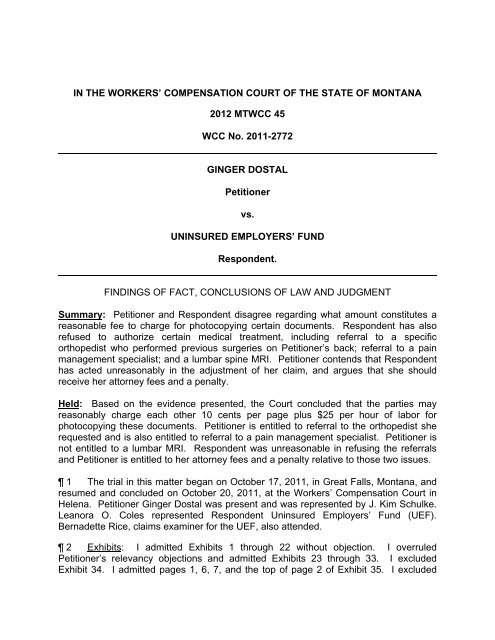
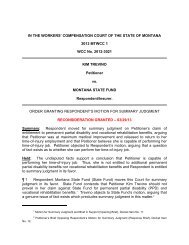
![Bustell v. AIG Claims Service, Inc. [05/03/05] 2005 MTWCC 23](https://img.yumpu.com/49777654/1/190x245/bustell-v-aig-claims-service-inc-05-03-05-2005-mtwcc-23.jpg?quality=85)
![Vallance v. MCCF [07/05/06] 2006 MTWCC 26 - Workers ...](https://img.yumpu.com/48724322/1/190x245/vallance-v-mccf-07-05-06-2006-mtwcc-26-workers-.jpg?quality=85)
